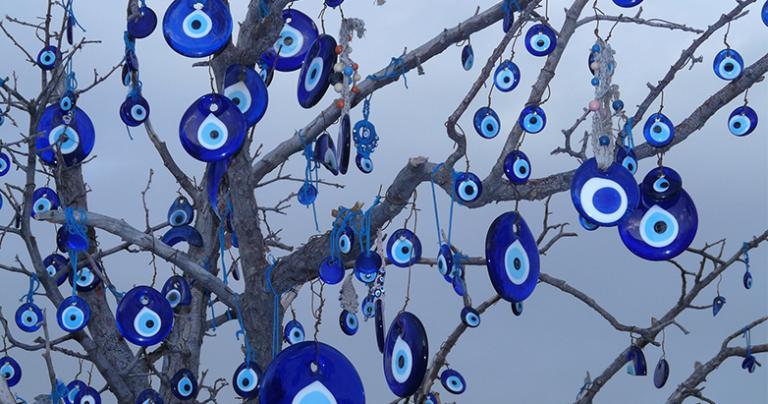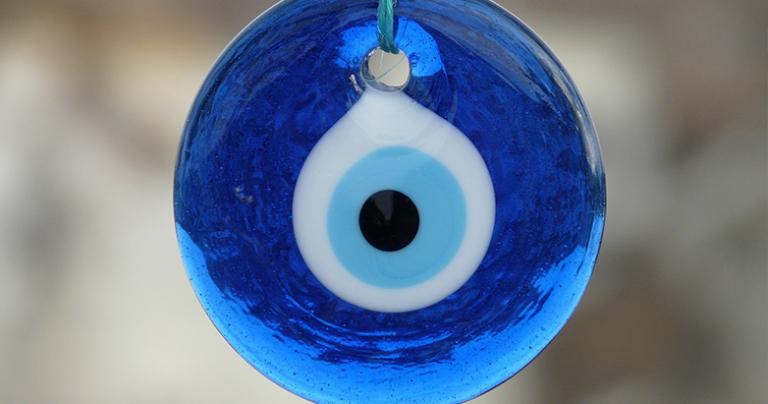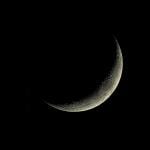Since I was a kid, there was a blue eye used as an amulet for babies to be protected. Only when they were one year old or so, or when my grandparents considered enough time had passed by, they removed the pendant from the child’s clothes. Later in life, I discovered this amulet is called nazar, is against the evil eye, and can be used by actually anyone, not only babies.

What’s the Evil Eye?
Annwyn Avalon, from The Water Wich, wrote an excellent article about the matter and its cultural significance, offering a brief but interesting look at it through different cultures. Instead of saying the same as her, maybe with a few differences, I prefer to share my experiences and my family’s teachings in the matter. For those who would like an audiovisual explanation, I also got you covered.
In short, it is a curse someone may be conscious of or not based on envy, greed, and/or admiration. Its effects always vary a bit, but most of the time the affected person feels week, afraid, has nightmares and gets sick very easily. Due to a familiar experience, I think it is also connected to the context of when and where the evil eye was sent.
When sent by an envious person, their hate and desire are directed at a person who has something or someone they don’t. Either verbally or mentally, a person can send those negative vibes toward the one who has their desired object, or sometimes it can also be because of a project or a job.
Once, my mother was given the chance to sell Arabic food in a bazaar. We knew there was already a meals’ food, but they were more oriented toward breakfasts, and ours was more for lunch. When midday came and the customers started buying more at our table than at the other one, my mother felt the owner’s eyes on her all the time.
This woman was so annoyed and her face was so upset that even the organizer had to come to our tables and see what was happening because even the customers felt the tension between both tables. In the end, my mom and I sold everything we had, but she had a very bad night, feeling bad in the stomach and feeling strong indigestion.

The “Unintended” Evil Eye
However, you can also send the evil eye when admiring someone’s belongings, success, or even a child, especially when they’re newborn. I was told from a young age that even high admiration could cause harm in the form of the evil eye, a belief I’m sure is influenced by my family’s Druze belief, which states that everything in excess becomes dangerous.
My little brother, for example, always needed to have a nazar with him because people always said he was cute, beautiful, and funny, even more during his first year of life. Everyone wanted to hug him, tickle him, kiss him, and his skin was always irritated, he always hit a part of his body, mostly his head, or got sick when he didn’t have the amulet.
This happened to some of my cousins as well, mostly when people came to visit my uncles and aunts to congratulate them on the new child. After so many visits, some of my cousins would go sick like my brother, experiencing some of the same effects as him. I also saw this happen when we visited someone and the baby started to cry for no apparent reason. My grandmother would then give them a nazar after blessing it with many prayers.

How do You Use the Nazar? What if I Don’t Have One?
There are a lot of designs now in the market, with the nazar coming in several colors, but I’ve never seen any of those in my family or any Arabic family. I even look at them with suspicion, and my grandmother always gives a blue nazar. About the color blue, Ellen Lloyd, owner of AncientPages.com, explains that:
The color blue in the Nazar amulet is of particular importance. History reveals many ancient cultures considered blue color to be of divine origin. Ancient Egyptians saw the deep blue color of water as life and blue sky was divine.
Sumerians made many statues of beings who had very big and blue eyes. Like many other ancient civilizations, the Sumerians considered blue eyes to be a sign of gods.
Also, blue eyes were an unusual color in western Asia. Blue eyes were perceived as having powerful magic, powerful enough even for deflecting the Evil Eye.
My grandmother always tells us to put a small golden pendant with a blue nazar in it for babies to be protected. For adults, any piece of jewelry is okay. This amulet can also be hung on the home’s main entry, on the rooms’ doors, and in cars and vehicles to stay out of harm. Grandmother always prays in Arabic before giving one, or when a baby needs when extra protection.
However, she’s not always carrying one in her purse or in her car, and some in my family don’t even speak Arabic. When she doesn’t have an amulet or she needs to heal or protect someone, she always takes a glass of water, prays and blesses the water, and uses a bit of it to wash the person’s face. The rest is for this person to drink. A piece of jewelry of the same light blue color can be used as a substitute for the eye
“Bismillah al rahman al rahim”, meaning “In the name of God, most Gracious, most Compassionate“, or simply “In the name of God”, is a simple and effective phrase she uses, as well as my mother and I, when we suspect something evil is around or when we get out of the house. I’ve also heard grandmother say this phrase when blessing the water, among others you can barely hear. She gets very emotional and sometimes even cries when doing this, so you need to really feel love and compassion for the affected person.
This is not the first time I hear about the healing powers of water and its use as a channel for good energies. Masaru Emoto has written several books on the topic, The Hidden Messages in Water being one of the most known, if not the first one people think about when reading or hearing his name.
Obviously, you don’t need to pray in Arabic. The Gods and Ancestors don’t speak only Arabic, but try to do it if you’re aiming to have the help of Arabic-speaking spirits. All you really need is to feel it and act with love. Divine energy is intelligent, so it will do its job after you do yours.


















